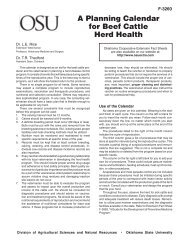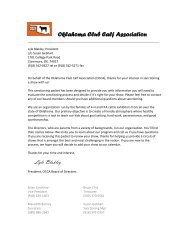Basics About Beef - the Oklahoma Club Calf Association
Basics About Beef - the Oklahoma Club Calf Association
Basics About Beef - the Oklahoma Club Calf Association
You also want an ePaper? Increase the reach of your titles
YUMPU automatically turns print PDFs into web optimized ePapers that Google loves.
PROTEIN<br />
4<br />
<strong>Beef</strong> supplies complete, high quality protein. Proteins are<br />
made up of amino acids. We need 20 amino acids, but only<br />
nine are essential, meaning <strong>the</strong>y must come from food.<br />
The body makes <strong>the</strong> remaining nonessential amino acids.<br />
Proteins which contain all of <strong>the</strong> nine essential amino acids<br />
in proportions most useful to <strong>the</strong> body are called complete<br />
proteins. Some plant proteins, when eaten alone, do not<br />
contain all of <strong>the</strong> essential amino acids in sufficient<br />
quantity and <strong>the</strong>refore are incomplete. Complete proteins<br />
such as those in beef help to build, maintain and repair<br />
body tissues, form body hormones and enzymes, and<br />
increase resistance to infection and disease.<br />
One 3-oz. (85g) cooked burger of 85% lean/15% fat<br />
ground beef will supply 42% of <strong>the</strong> DV* for protein.<br />
B-VITAMINS<br />
Adequate B-vitamin intake has been associated with<br />
improved cognitive performance. <strong>Beef</strong> contains significant<br />
amounts of several B-vitamins.<br />
Niacin (Vitamin B 3 ) promotes healthy skin and nerves,<br />
aids digestion and fosters normal appetite.<br />
Vitamin B 6 helps <strong>the</strong> body make nonessential amino<br />
acids. It also helps form red blood cells and maintain<br />
brain function.<br />
Vitamin B 12 is needed for normal functioning of body cells<br />
and of <strong>the</strong> nervous system, and is only found naturally in<br />
animal foods.<br />
One 3-oz. (85g) cooked burger of 85% lean/15% fat<br />
ground beef will supply 25% of <strong>the</strong> DV* for niacin,<br />
16% of <strong>the</strong> DV* for vitamin B 6 and 40% of <strong>the</strong> DV* for<br />
vitamin B 12 .<br />
IRON<br />
One of <strong>the</strong> most important nutrients is iron. Iron helps red<br />
blood cells carry oxygen to and away from <strong>the</strong> o<strong>the</strong>r body<br />
cells. There are two types of iron. The iron in meat is called<br />
heme (hēm) iron and is easily utilized by <strong>the</strong> body. It also<br />
helps <strong>the</strong> body use <strong>the</strong> non-heme iron present in o<strong>the</strong>r foods<br />
such as legumes, grain products and vegetables.<br />
<strong>Beef</strong> is a good source of iron, a nutrient often lacking in <strong>the</strong><br />
diets of women, young children, teen girls and athletes.<br />
One 3-oz. (85g) cooked burger of 85% lean/15% fat<br />
ground beef will supply 13% of <strong>the</strong> DV* for iron.<br />
*Daily Value, <strong>the</strong> amount most people need each day.<br />
ZINC<br />
Zinc is a mineral <strong>the</strong> body needs to form enzymes and insulin.<br />
It also supports <strong>the</strong> body’s immune system. Deficiencies of iron<br />
and zinc may have a negative effect on behavior and cognitive<br />
functions like learning. As with iron, adequate zinc can be<br />
difficult to obtain without meat in <strong>the</strong> diet.<br />
One 3-oz. (85g) cooked burger of 85% lean/15% fat ground<br />
beef will supply 35% of <strong>the</strong> DV* for zinc.<br />
FAT, SATURATED FATTY ACIDS AND<br />
CHOLESTEROL<br />
Fats are responsible for <strong>the</strong> flavors, aromas and textures of<br />
foods. Fats also increase <strong>the</strong> feeling of “satiety,” or satisfaction,<br />
after a meal. Fats are needed to transport vitamins A, D, E and<br />
K into <strong>the</strong> body and through <strong>the</strong> walls of <strong>the</strong> digestive tract.<br />
Dietary fat is made up of three types of “building blocks” called<br />
fatty acids. Saturated fatty acids come from animal sources and<br />
some vegetables. They are often solid at room temperature.<br />
Monounsaturated fatty acids (MUFAs) are usually liquid at<br />
room temperature. Vegetable oil, peanut oil, olive oil and beef<br />
contain MUFAs. Polyunsaturated fatty acids are soft or liquid at<br />
room temperature. Examples include corn and soybean oils<br />
and most of <strong>the</strong> fat in seafood.<br />
A great deal of attention has been given to <strong>the</strong> health concerns<br />
with trans fatty acids (TFAs) in <strong>the</strong> diet. Trans fatty acids have<br />
been shown to lower “good” cholesterol, <strong>the</strong>reby increasing <strong>the</strong><br />
risk for heart disease. The vast majority of <strong>the</strong> TFAs consumed<br />
in <strong>the</strong> American diet come from man-made TFAs. These<br />
man-made TFAs are made from partially hydrogenated<br />
vegetable oils. Naturally occuring TFAs, found in animal<br />
foods, have been found to have health benefits and decrease<br />
<strong>the</strong> risk of heart disease.<br />
One such TFA found in beef and dairy products is conjugated<br />
linoleic acid (CLA) which has been shown to have many health<br />
benefits, such as <strong>the</strong> prevention of certain types of cancer.<br />
Cholesterol is a waxy, fat-like substance needed for cell<br />
building, manufacturing vitamin D and hormones, and<br />
o<strong>the</strong>r body functions. The liver produces as much cholesterol<br />
as <strong>the</strong> body needs, whe<strong>the</strong>r or not cholesterol is eaten.<br />
The Dietary Guidelines for Americans recommend we get less<br />
than 30% of calories from fat, less than 10% of calories from<br />
saturated fatty acids and less than 300mg cholesterol daily.<br />
Remember, <strong>the</strong> 30% fat goal refers to <strong>the</strong> entire diet over several<br />
days, not to each serving of food, or even to each meal.<br />
<strong>Beef</strong> can be part of a balanced diet that does not exceed <strong>the</strong><br />
limits for total fat, saturated fat and cholesterol. Typically, a<br />
3-oz. (85g) cooked burger of 85% lean/15% fat ground beef<br />
has 197 calories and provides 18% of <strong>the</strong> total fat, 23% of<br />
<strong>the</strong> saturated fatty acids, and 24% of <strong>the</strong> dietary cholesterol<br />
recommended on a 2000 calorie diet.







